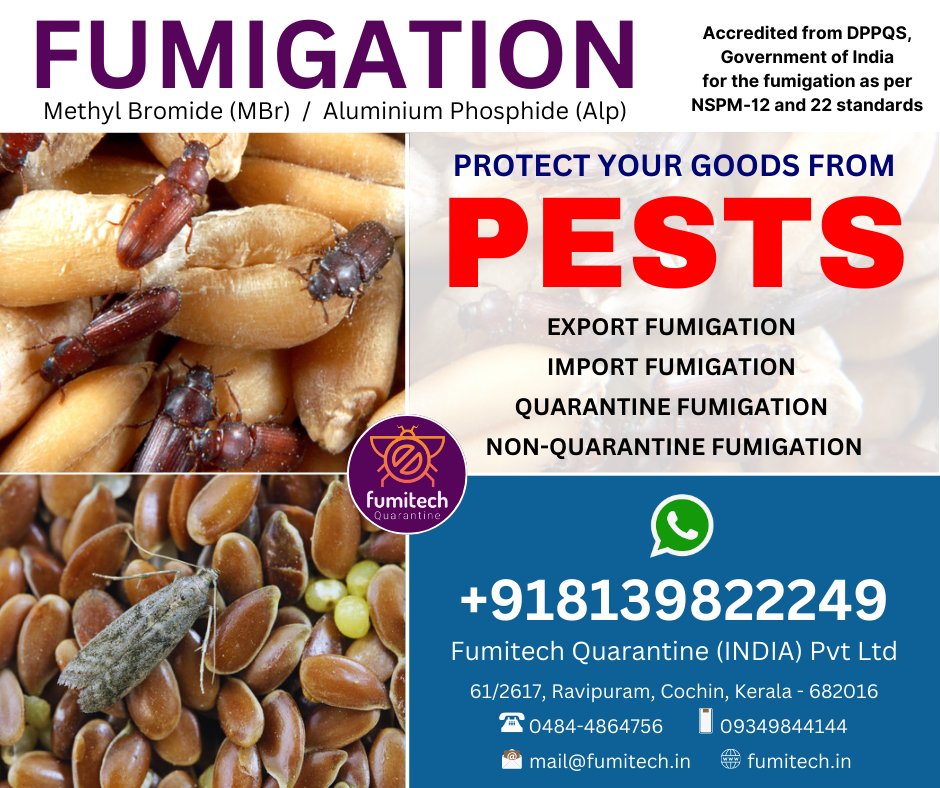
Fumitech's Fumigation Services (Fuma Care)
Discover innovative eco-friendly pest control solutions that are both effective and sustainable. Our methods ensure the safety of your home, protect your health, and preserve the environment. Choose a greener approach to pest management.
Fumigation is a crucial process in international trade, particularly for agricultural products, wood packaging materials, and other goods susceptible to pest infestation. It involves the use of chemicals or gases known as fumigants, to secure the goods by eliminating a wide variety of pests as mentioned below, and thereby preventing their spread to new locations.
1. Insects
Chewing Insects: These insects bite and chew on plant parts, causing direct damage. Examples include beetles, caterpillars, grasshoppers, and weevils.
Sucking Insects: These insects use specialized mouthparts to pierce plants and suck out their juices. Examples include aphids, mealybugs, whiteflies, and scale insects.
Boring Insects: These insects bore into plants, causing internal damage. Examples include wood-boring beetles, termites, and carpenter ants.
Storage Pests: These insects infest stored grains, seeds, and other products. Examples include weevils, moths, and beetles.
2. Rodents
Rats and Mice: These rodents can cause significant damage to crops, stored products, and buildings. They can also contaminate food and transmit diseases.
3. Fungi and Bacteria
Microscopic organisms: These pathogens can cause diseases in plants and animals. Examples include rusts, smuts, and bacterial blight.
4. Storage Pests
Storage pests are a specific group of insects that very quickly and innumerably infest stored grains, seeds, and other products. They can cause significant economic losses by damaging and reducing the quality and quantity of stored goods. Some common examples of storage pests include:
a. Weevils: These small, beetle-like insects can infest a variety of stored products, including grains, nuts, and dried fruits.
b. Moths: Moth larvae can damage stored grains and other products, causing them to become contaminated, damaged and unmarketable.
c. Beetles: Several species of beetles can infest stored products, including flour beetles, grain beetles, and sawtoothed grain beetles.
Controlling storage pests is essential for preventing economic losses and ensuring the safety of food products. Proper storage practices such as maintaining clean and dry conditions; and implementation of right pest control measures can help to reduce the risk of infestation.
Fumigants Used:
1. Methyl Bromide: A highly effective fumigant but with concerns about its ozone-depleting properties. Its use has been restricted or banned in many countries.
2. Phosphine: A widely used alternative to methyl bromide, known for its effectiveness against a variety of pests.
The specific fumigation requirements for different products and destinations can vary. It's essential for exporters and importers to be aware of the regulations and standards that apply to their shipments. In conclusion, fumigation plays a vital role in ensuring the safety and quality of international trade. By preventing the spread of pests and diseases, it protects both domestic ecosystems and imported goods, while also complying with international regulations and safeguarding public health.
Fumitech is a famous Fumigation Service Provider in Kerala over the last two decades. Fumitech is licensed from the Department of Plant Protection, Quarantine and Storage, under Ministry of Agriculture, Government of India. Fumitech render the best fumigation services to protect export / import goods from a wide range of pests. Fumigation for the Cargo, Container, Ship (Vessel), Chamber, Plant and Machineries, Silo, Bin etc. are available with Fumitech's Fuma Care Service.
For more details, visit: Fumitech's Official Website
